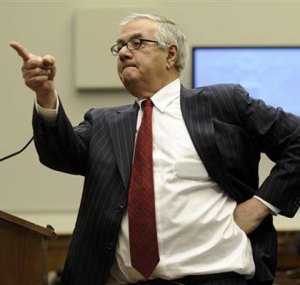Posts Tagged ‘GSE Meltdown’
Barney Frank Proposes New Bank Resolution Authority
After years of Fed policies which allowed mergers of massive banks to form the very mega-banks which have now failed, Barney Frank, after his years of rebuking repeated efforts by Republicans to reform the system, is only now rising up to look the hero.
On October 27, 2009, House Financial Services Chairman Barney Frank (D-Mass.) released the latest version of the most complex piece of the financial reform puzzle: solving the “too big to fail” problem by giving the federal government more powers to wind down major financial firms.

Barney Frank blamed others for the mortgage industry meltdown while literally in bed with Fannie Mae.
Frank’s bill seeks to avoid the kinds of massive taxpayer bailouts that characterized last year’s financial crisis by empowering the federal government to wind down any financial firm, no matter how large, complex or interconnected.
“We’re going to have death panels. But they’re going to have death panels that are going to put to death these institutions before they can cause us problems, not old people,” — Frank said in a CNN interview Tuesday.
Back in 2003, House Ways and Means Committee Chairman Frank led the government charge that helped create the GSE meltdown (time line here). He made this now infamous quote about new terms to lower lending standards of Fannie Mae and Freddie Mac
I do think I do not want the same kind of focus on safety and soundness that we have in OCC [Office of the Comptroller of the Currency] and OTS [Office of Thrift Supervision]. I want to roll the dice a little bit more in this situation towards subsidized housing.
Under Frank’s new (I’ve found God) vision, shareholders and unsecured creditors would have to pay for the failure, not taxpayers, according to a summary of the bill. The legislation would require resolution costs to come first from the failed firm’s assets “at the expense of shareholders and creditors,” with any additional cost to be paid from an after-the-fact assessment on the remaining large financial firms.
But as we all know, except for perhaps Frank, the costs of these penalties will ultimately be passed on to the consumer in the form of bank processing and administration fees.
Frank’s proposal reeks of a “let the bank fail and allow the market to absorb the consequences” tactic which the Feds dismissed earlier in the crisis, preferring to instead follow their “too big to fail” philosophies.
The bill’s proposal for an oversight council to act as the so-called “systemic risk regulator” to keep an eye on the overall health of the financial industry also sounds suspiciously like Bush’s proposals first advanced in 2001. The council would be directed to identify risky firms and financial activities, and have the power to slap tougher rules and standards on those firms.
Frank said Tuesday morning on CNN that the systemic risk council would also have the power to break up a company “if its too big.”
Frank’s use of the term “systemic risk” mirrors comments made in April 2005 when Secretary of the Treasury John Snow repeatedly called for GSE reform, saying
“Events that have transpired since I testified before this Committee in 2003 reinforce concerns over the systemic risks posed by the GSEs and further highlight the need for real GSE reform to ensure that our housing finance system remains a strong and vibrant source of funding for expanding homeownership opportunities in America … Half-measures will only exacerbate the risks to our financial system.”
Then house Minority Leader Harry Reid rejected the legislation saying ” we cannot pass legislation that could limit Americans from owning homes and potentially harm our economy in the process.”
Frank’s proposed Council and Fed Board would be banned from publicly releasing a list of “systemically significant” institutions – a major concern in the industry which fears that those singled out would be penalized by the market.
If these institutions were to be publicly singled out, it might have positive results on the market as banks would have a built-in incentive to engage in policies which minimize risk to themselves.
Written by Ben
November 3, 2009 at 12:12 pm
Posted in Barney Frank, Fannie Mae Freddie Mac Bailout, Market Meltdown, Politics
Tagged with Barney Frank, GSE Meltdown, Politics



